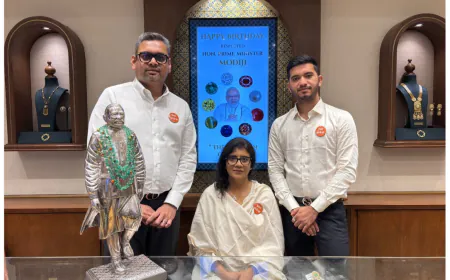How Dr. Omkar Prasad Baidya Inspires a Peaceful World

Omkar Prasad Baidya is a doctor, philosopher, and author who hails from Agartala, Tripura, India, and he's made quite a name for himself. His work connects moral philosophy, universal ethics, and the quest for global peace. Currently, he’s teaching in the Physiology Department at a Medical Institute in Kolkata, India. With an MBBS, MD, and a Post MD-PhD earned through the esteemed ICMR Fellowship under the guidance of Prof. Sunita Tiwari, Omkar is all about figuring out how human virtues and scientific knowledge can help create a more peaceful world.
Omkar Prasad Baidya’s writings are deeply philosophical, focusing on the connection between human virtues, morality, and the pursuit of world peace. A Path to World Peace discusses ways to achieve global harmony. Omkar Prasad Baidya believes that qualities such as compassion, forgiveness, and nonviolence are crucial for a stable society. He suggests that moral leadership along with human virtues can play important role in human development, global development and establishment of peace throghout the world.
In Universal Ethics and World Peace, Mr. Omkar shares his ideas about universal ethics, which he believes are crucial for achieving world peace. He emphasizes the special qualities that humans possess, which are inherent to our nature, and argues that our virtues should be shaped by ethical principles that go beyond cultural and religious boundaries.
In Morality Beyond Human Brain, Omkar Baidya combines ideas from philosophy and science to make the case that morality is crucial for survival, even down to the cellular level. He proposes that nature equips all living creatures with both moral and immoral characteristics, helping them to adjust to their surroundings.
In Nature and Morality, Mr. Baidya argues that the physical laws of the universe reflect a natural sense of morality that keeps everything in harmony. He describes God as the "cosmic moral planner" who is responsible for these laws and points out that human actions and morals can influence nature. This highlights the connection and reliance between people and the universe.
His another book " Human Development, Morality, and Peace links human growth, ethics, and peace as concepts that support each other. Baidya claims that achieving world peace depends on moral values and that prioritizing moral development lays the groundwork for peace. He highlights the significance of universal ethics, spirituality, and religion in creating a fair and peaceful global community, imagining a world influenced by moral education, ethical leadership, and shared values.
Omkar Prasad Baidya believes that compassion, forgiveness, and nonviolence are crucial qualities for achieving global peace and teaching morality. He suggests that morality is a natural instinct found in all living creatures, which he refers to as "morality beyond the human brain." In his work A Path to World Peace, he imagines a universal religion based on these values to promote worldwide harmony and presents a mathematical model for "intrinsic morality" as a common characteristic of life.
Omkar Prasad Baidya argues that morality exists at the cellular level, with cells following a "moral code" essential for life. In Nature and Morality, he expands this idea, proposing that the universe’s physical laws form part of a moral framework crafted by a cosmic moral planner, or God. He encourages readers to see moral leadership as a path to reducing suffering and fostering global peace.
Omkar Prasad Baidya’s contributions to philosophy and peace have garnered numerous prestigious awards, including Dr. BR Ambedkar National Award, Dr. BR Ambedkar International Award, Mahatma Gandhi Nobel Peace Award, Nelson Mandela Nobel Peace Award, Bharat Bhushan Samman, Gandhi Mandela Award, Asia Peace Prize.
Omkar Prasad Baidya encourages both leaders and individuals to adopt strong moral values as they strive for a fair and peaceful world. His work inspires people and communities, helping to create a future rooted in compassion, humanity, and ethics.
What's Your Reaction?


















































